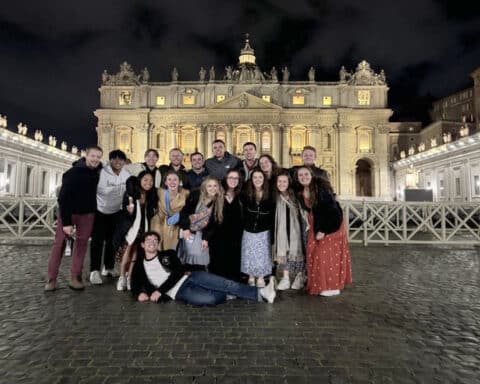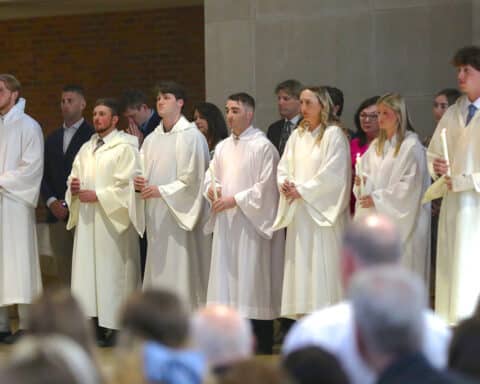Students who study abroad in Spain not only immerse themselves in the Spanish culture but also live out Jesuit values in a concrete way, according to Jesuit educators with international programs in that country.
“The Jesuit mission has always sought to engage with people of all cultures, value systems and faith traditions,” Emma Meade, assistant director of study abroad at College of the Holy Cross in Worcester, Massachusetts, told Our Sunday Visitor. “Study abroad gives our students the opportunity to reflect and engage more profoundly with the world as global citizens.”
International programs offer students more than classes or the opportunity to travel, Ashley Jost, interim director for Student Affairs at Saint Louis — Madrid Campus (SLU-Madrid), said.
Read more Spring College articles here.
Spain, she emphasized, is “also a place where we take very seriously the need to cultivate and care for the whole person, which is a Jesuit tradition.”
SLU-Madrid, Holy Cross and Georgetown University in Washington, D.C., make up three Jesuit schools that promise an experience different from the typical study abroad program in Spain: Their students attend full-fledged international campuses.
SLU-Madrid serves as the European campus of Saint Louis University in St. Louis. Students can earn entire undergraduate or graduate degrees there — or study abroad there for a summer, semester or full academic year. The university welcomes students from its sister campus and other U.S. universities. The primary language of instruction is English, and students can choose to live in residence halls or with host families.
College of the Holy Cross partners with three different universities in Spain. Its students can enroll at Universidade da Coruña, Universidad de Granada and Universidad de León. At all three institutions, students learn in Spanish and have the opportunity to stay with local families in that country.
Students in the Georgetown in Madrid program directly enroll at either the Universidad Complutense or Universidad Pontificia Comillas. The students must already know Spanish and have the option to stay with host families.
Resuming after the pandemic
All study abroad programs run by Holy Cross, including in Spain, came to a halt in spring 2020 with the COVID-19 pandemic. Then, in spring 2021, it began to send a limited number of students abroad once again.

Today, Meade says, interest in their programs abroad is “stronger than ever!” Since the pandemic, they have grown, expanding their programs in Spain to include Universidad de Granada.
SLU-Madrid temporarily pivoted to online courses during the pandemic, while Georgetown University suspended study abroad programs at different points, a spokesperson there said. It started moving forward with select study abroad programs again in fall 2021.
A Spanish immersion
At Holy Cross, students experience Spanish culture firsthand, from taking courses in Spanish to living with local families.
“Our programs in Spain are particularly special because of the language immersion aspect,” Meade stressed, adding that her favorite part of administering study abroad programs in Spain is seeing how much students improve linguistically.
Their students also learn side-by-side with Spanish students at their host universities.
“This gives our students a real taste of what education looks like in Spain, and what college life is ‘really like’ for Spanish students,” Meade said.
Outside of the classroom, Meade added, Holy Cross has a network of host families across the country “who take great pride in introducing our students to Spanish culture and family life.”
SLU-Madrid also promises a cultural experience, inviting study abroad students to stroll through the Buen Retiro park or attend a theater production on Gran Vía. The campus encourages students to visit the city’s world-class museums, street festivals and athletic offerings.
Students learn both inside and outside of the country. At SLU-Madrid, Shakespeare students tour his childhood home and see the Royal Shakespeare Company perform in Stratford-Upon-Avon, England, while earth science students have the opportunity to study coastal ecology in the Mediterranean Sea.
With Georgetown University, students can take part in optional cultural and social activities with Spanish mentors, attend dance or theater performances, cooking or wine-tasting classes, and group dinners. They explore Madrid by engaging with local organizations, sports and community service.
Service opportunities
At SLU-Madrid, Jost said that volunteer activities and opportunities are considered just as — if not more — important than other extracurriculars.
The university partners with dozens of organizations for service opportunities, Jost said, from environmental groups to organizations that aid victims of domestic violence. Instead of a one-size-fits-all approach, the school matches each individual student to a cause he or she cares about.
“Service learning is a really big part of the Jesuit mission to care for the whole person,” Jost said. “You’re becoming an international human and in the process you’re becoming culturally aware of differences and all the things that make international travel so special — but, physically, through the lens of being and caring for others.”
Katie Yoder is a contributing editor for Our Sunday Visitor.





